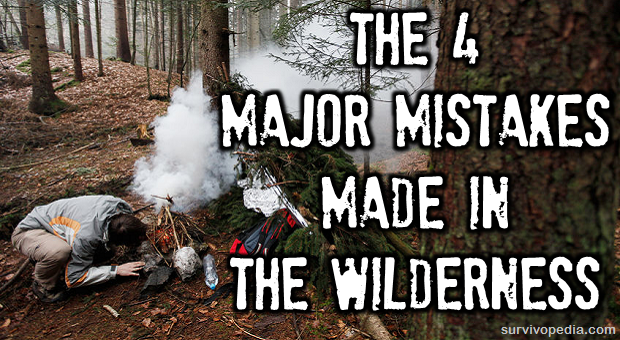You start your day thinking that you must take advantage of the last warm, sunny days of autumn and go on that long awaited and planned for hike. You won’t need much for the short journey, as you’ll be safely home by dawn. And there’s nothing that could ruin this perfect day you have in mind.
That’s unless you get distracted and separate from your group… then, step on some slippery rock and brake a bone or two… and end up isolated in the wilderness, just like the 62 year old lady that survived 9 days in these conditions. But would you?
Let’s see what you can do to make sure you are the survivor in this story, because the same conditions apply when bugging out in the wilderness when SHTF.
1. The Wrong Clothing
 You may think it’s cool to pose for that selfie to impress your friends with of your latest super mountaineer 200 dollar Everest hiking boots, Genuine African Safari style khaki shorts, and 70 dollar authentic Australian Bush hat before your next mountain hiking expedition.
You may think it’s cool to pose for that selfie to impress your friends with of your latest super mountaineer 200 dollar Everest hiking boots, Genuine African Safari style khaki shorts, and 70 dollar authentic Australian Bush hat before your next mountain hiking expedition.
But there’s an important reason why the military went with long pants for jungle work instead of the classic WWII hot climate field shorts. When that first foot long poisonous centipede crawls under your open leg shorts and into those nether regions, I guarantee you will never wear ‘shorts’ of any kind again. Even to bed!
The general rule of thumb is to always dress/carry one layer warmer than you would need for the temperatures you are expecting. Removing or adding as necessary. The lady who survived in the above example had long pants, and a jacket with her which contributed to her night time hypothermia ‘salvation’. Remember ‘Cotton is Rotten’.
Yes, it’s more comfortable, but it retains the moisture too close to your skin. In a desert that might be desirable during the day when you need to stay cool, but not most other places where there are fairly large temperature swings between daylight hours right down to freezing temps after a balmy sunny day.
There is no excuse for being improperly dressed anymore with all the amazing new survival/sporting clothing and accessories they have now.
2. Inadequate Water, Food and Fire Prep.
The 62 year old woman above was smart. Even though it was only a ‘day’ hike trip and the group would come back before dark to a base campground, and the usual thing would be to bring a canteen or two of water with you for the day, in this case, she brought one of those ‘life straw’ filters which is good if you are lost for days and need to drink from dubious sources which you don’t need to get sick from otherwise.
They are small enough not to have any weight related excuses to not carry them. But I would always carry something like the aforementioned pocket Mylar Space Blankets to make a solar still, along with a cup/canteen to capture the condensing water also.
3. No Fire Making Tools or Skills.
 Another area where there’s no excuse for not being able to make a fire almost anywhere because of all the small compact fire starting devices and accessories available. I can fit and keep redundant fire starters in one vest or ‘cargo pants’ pocket.
Another area where there’s no excuse for not being able to make a fire almost anywhere because of all the small compact fire starting devices and accessories available. I can fit and keep redundant fire starters in one vest or ‘cargo pants’ pocket.
Fires not only keep you from freezing to death but they keep the larger animal predators away and can cook your food if you have some or trapped anything, and provide a locator signal to searchers. But just having the tools does not guarantee anything. You must practice how to use these, especially in the rain.
4. Lack of Good Wilderness Navigational Skills and Equipment.
Last but certainly not the least, you should have a way to immediately call for help if you are lost or down, or trapped, so you don’t have to worry about ’surviving’.
Cell phones with GPS signaling are nice, but if you are out of range, usually only around 5 or six miles of a cell tower, then what? It’s bad enough that after all my never missed ’experience’ in the wilderness’ of the world that to me ’camping’ nowadays is a cheap motel.
If I ever again found myself really, really needing to go somewhere in the backwoods for any insane reason, I would not even un-ass my truck without my pocket size VHS Air Band compact Transceiver, with a freshly installed battery and a backup one.
Added to that my compass and area maps. With this radio I can actually get around 50 or so kilometers of LOS range which covers a pretty expanded search plane area. And if I got on a hill top I could even tune into and navigate to VOR beacons as many stations are on mountain tops and indicated on maps for location reference.
But If I was really badly stranded and waiting for rescue planes/choppers I’d tune to any aircraft I hear overhead on the Unicom or emergency frequency and talk directly to the pilots to guide them in to where I’d set up my twenty dollar 600 lumen pocket flashlight on the ground with the SOS strobe feature to guide them in.
These radios are pricey, but well worth it if you really value your life. Nowadays, of course, they have good pocket GPS satellite locators which would also be better than a cell phone, unless the cell phone had one in it.
And as for a sound signal device to any ground searchers, I’d pop a round or two from my 16 round capacity Glock 20-C that I would never leave home for the wilderness without. Which is mainly protection from big bears and other things that go ’bump in the night’. And works a lot better than a whistle.
By the way, the equipment mentioned here should be mandatory carry for even a short day hike. And it all fits on your belt or in your cargo pants and jacket/vest pockets. No need even for a small backpack if you want to travel light.
So it all comes down to having a plan before you go out to enjoy yourself. You need to plan to KNOW–NOT imagine– what to expect on your excursion and have the adequate knowledge, skills, and equipment. If you don’t, Mother Nature will make you follow her own plan. And you now know what that is.
Interested in how to improve you medical survival skills? CLICK HERE to find out!
This article has been written by Mahatma Muhjesbude for Survivopedia.
About Mahatma Muhjesbude
Mahatma Muhjesbude is a former Spec-ops combat Vet, LEO, international security consultant, and private contractor. He has instructor level credentials and skills in various survival disciplines. He is a dedicated advocate of Liberty and Justice for all and a proactive defender of our Constitutional rights. He strongly believes that the best value you can give back in life is vital knowledge through experience, and that’s why he’s writing for Survivopedia, using a pen name to protect his real identity. You can send Mahatma a message at editor [at] survivopedia.com




